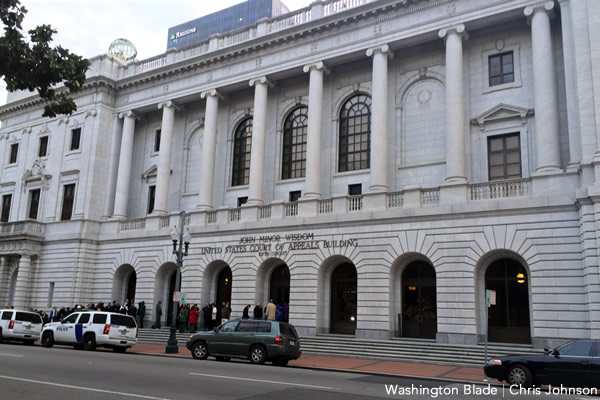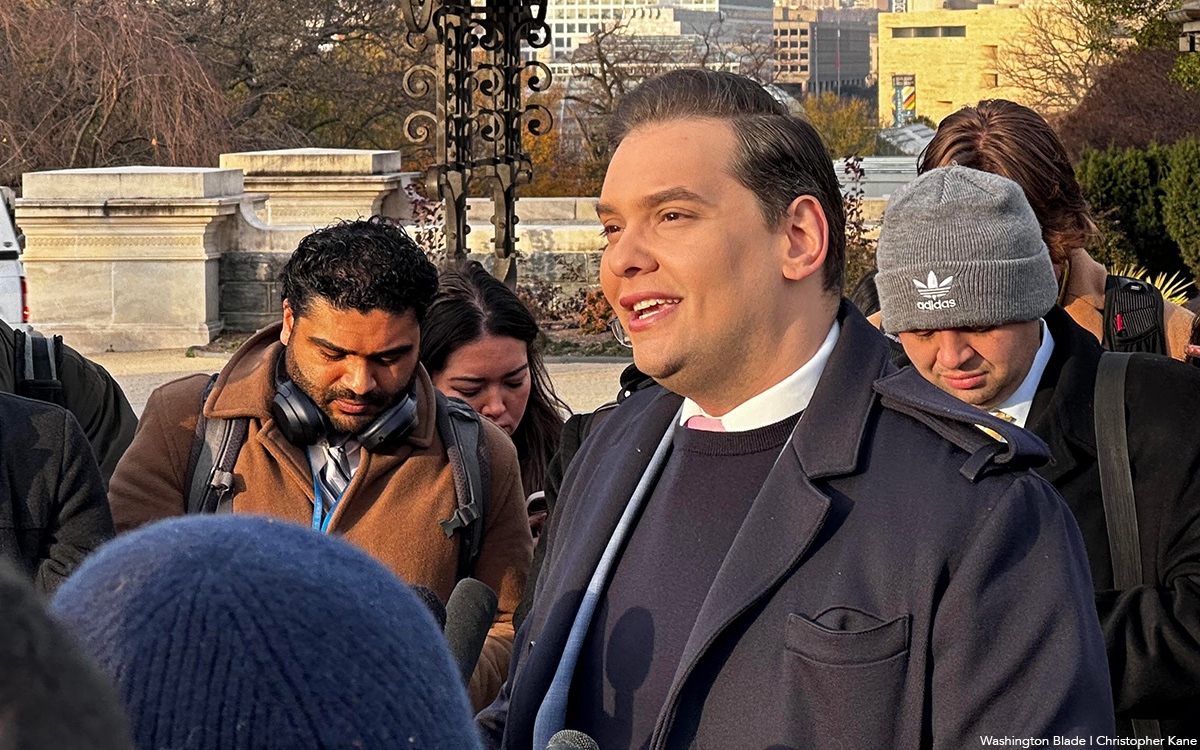U.S. Federal Courts
VP, Press Secretary condemn appeals court’s abortion pill ruling
Outcome of the case now pending decision by the U.S. Supreme Court

Vice President Kamala Harris and White House Press Secretary Karine Jean-Pierre issued separate statements on Wednesday objecting to a ruling by the U.S. Court of Appeals for the Fifth Circuit, which upheld a lower court’s restrictions on access to the abortion pill mifepristone.
Both, however, noted the U.S. Supreme Court’s issuance in April of a stay in the case, Alliance for Hippocratic Medicine v. FDA, which halted the enforcement of any changes to the drug’s availability pending the outcome of the appeals process.
The lawsuit aims to invalidate the U.S. Food and Drug Administration’s 23-year-old approval of mifepristone, a medication that scientific and medical experts overwhelmingly agree has since been proven safe and effective.
Harris and Jean-Pierre stressed that the restrictions handed down by the appellate and district courts constitute medically unnecessary barriers to reproductive healthcare, while the litigation threatens to imperil the FDA’s statutorily ordained right to exercise its expert judgment over drug products in the U.S.
“The President and I remain committed to protecting a woman’s right to make decisions about her own health care,” the vice president said.
The press secretary echoed those comments. “The Administration will continue to stand by FDA’s independent approval of mifepristone as safe and effective,” she said, adding, “The Department of Justice announced that it will be seeking Supreme Court review” of the Fifth Circuit’s decision.
At this juncture, the High Court could decline to review the case, which would effectively allow the appellate court’s ruling to stand, but many legal experts believe the justices are likely to weigh in considering the importance of the legal questions at issue.
U.S. Federal Courts
Melissa DuBose becomes first Black and first LGBTQ judge on federal court in R.I.
Senators also advance Nicole Berner’s nomination

Judge Melissa DuBose was confirmed by the U.S. Senate on Tuesday for her appointment by President Joe Biden to the U.S. District Court for the District of Rhode Island, where she will be the first Black and the first LGBTQ judge to serve on the bench.
DuBose thanked her partner Amy “for blessing me with over two decades of unwavering love, support, laughter and patience,” and their “two remarkable sons … for gracing me with that special love that is reserved for mothers and sons.”
The vote was 51-47, with only two Republicans supporting her nomination, Susan Collins of Maine and Lindsey Graham of South Carolina.
During a confirmation hearing in February, U.S. Sen. John Kennedy (R-La.) grilled DuBose about an article 24 years ago in which she was quoted as saying she had gone through “a Marxist phase.”
Currently serving as associate judge on the Rhode Island District Court in Providence, DuBose’s nomination was enthusiastically supported by her state’s two Democratic U.S. senators., Jack Reed and Sheldon Whitehouse.
“She’s proven to be an exceptional jurist with a stellar record,” said the former on the Senate floor, adding, “She has dedicated her life to public service, and Rhode Island is fortunate that she has once again answered the call.”
Whitehouse said, “This is a person, a lifelong Rhode Islander, who is exceedingly well regarded in our community.”
Nicole Berner’s nomination advances
Another lesbian judge nominated by Biden to serve a lifetime tenure on the federal bench is Nicole Berner, who has long served as general counsel of the Service Employees International Union and was tapped to join the 4th U.S. Circuit Court of Appeals.
The Senate moved for a cloture vote on her nomination Thursday, meaning a final vote is expected as early as next week. She would be the first LGBTQ judge on the circuit court and the 11th confirmed LGBTQ judge nominated by Biden — tying with the record number who were appointed by former President Barack Obama over two terms in office.
U.S. Federal Courts
N.Y. AG joins multi-state brief in Colo. anti-trans discrimination case
Letitia James and 18 other attorneys general support plaintiff

New York Attorney General Letitia James on Wednesday joined a brief by 18 other Democratic state attorneys general urging the Colorado Supreme Court to uphold a lower court ruling against Masterpiece Cakeshop for anti-trans discrimination.
A customer, Autumn Scardina, sued the business over claims that it refused to provide her a cake upon learning that it was for a celebration of her transition. The case is not the first in which owner Jack Smith has faced claims of anti-LGBTQ discrimination.
In 2012, Masterpiece Cakeshop refused to fulfill an order for a wedding cake for a same-sex couple, which led to the 2018 U.S. Supreme Court case Masterpiece Cakeshop v. Colorado Civil Rights Commission — and a narrow ruling that did not address core legal questions weighing the constitutionality of First Amendment claims vis-a-vis the government’s enforcement of LGBTQ-inclusive nondiscrimination laws.
“Denying service to someone simply because of who they are is illegal discrimination, plain and simple,” James said in a press release. “Allowing this kind of behavior would undermine our nation’s fundamental values of freedom and equality and set a dangerous precedent.”
She added, “I am proud to stand with my fellow attorneys general against this blatant transphobic discrimination.”
The Colorado Court of Appeals ruled in favor of Scardina, noting that Smith objected to fulfilling her cake order only after learning about her intended use for it “and that Phillips did not believe the cake itself expressed any inherent message.”
The fact pattern in both cases against Masterpiece Cakeshop resembles that of another case that originated in Colorado and was ultimately decided by the Supreme Court last year, 303 Creative LLC v. Elenis.
This time, the justices did not sidestep the question of whether the state’s anti-discrimination law can be enforced against a business owner, Lorie Smith, a website designer who claimed religious protections for her refusal to provide services to a same-sex couple for their nuptials.
The court’s conservative supermajority ruled in favor of Smith, which was widely seen as a blow to LGBTQ rights.
Joining James in her brief are the attorneys general of Connecticut, Delaware, Hawai’i, Illinois, Maine, Maryland, Massachusetts, Michigan, Minnesota, Nevada, New Jersey, Oregon, Pennsylvania, Rhode Island, Vermont, Washington and D.C.
U.S. Federal Courts
Fla. man found guilty of threatening George Santos
Gay former NY congressman expelled in December

On Feb. 22, following a two-day trial, a federal jury in Ft. Lauderdale convicted a man for calling the office of former U.S. Rep. George Santos (R-N.Y.) in D.C. and threatening to kill the member of Congress and another person.
On Jan. 29, 2023, Frank Stanzione, 53, of Boynton Beach, Fla., made a telephone call from his residence in Boynton Beach to the office of a member of the U.S. House of Representatives. Stanzione left a voice message for the member that stated the following:
“[Victim 1 former Rep. Santos] you fat fucking piece of shit fucker. You better watch your mother fucking back because I’m gonna bash your mother fucking fucker head in with a bat until your brains are splattered across the fucking wall. You lying, disgusting, disgraceful, mother fucking fucker. You mother fucking piece of shit. You’re gonna get fucking murdered you goddamn lying piece of garbage. Watch your back you fat, ugly, piece of shit. You and [Victim 2 Redacted] are dead.”
The congressman’s chief of staff reported the message to the U.S. Capitol Police the next morning. The USCP began investigating the voice message as a threat and determined that it was made from a telephone number assigned to Stanzione.
On Jan. 31, 2023, USCP special agents went to the address associated with the telephone number and interviewed Stanzione. USCP confirmed that Stanzione had left the voice message for the congressman. Stanzione found the telephone number on an online search engine.
In a motion to dismiss, lawyers for Stanzione noted in the interview he told federal agents that “he feels offended by Santos and does not want him in his (gay) community.” He said he left the message to make Santos “feel like a piece of shit.”
The court filing described Stanzione as “a long-standing, active advocate for gay rights.”
In the motion to dismiss, Stanzione claimed his prosecution was “retaliatory and vindictive” and “based upon his exercise of political speech related to gay rights.”
“Others who have allegedly committed similar acts,” his attorneys stated in the motion, “have not been prosecuted.”
U.S. Attorney Markenzy Lapointe for the Southern District of Florida and USCP Chief J. Thomas Manger announced the guilty verdict. The USCP – Threat Assessment Section investigated the case.
Stanzione will be sentenced in May and faces penalties including up to five years in federal prison, a fine of up to $250,000, or both.
-

 District of Columbia3 days ago
District of Columbia3 days agoCatching up with the asexuals and aromantics of D.C.
-

 State Department5 days ago
State Department5 days agoState Department releases annual human rights report
-

 South America3 days ago
South America3 days agoArgentina government dismisses transgender public sector employees
-

 Maine4 days ago
Maine4 days agoMaine governor signs transgender, abortion sanctuary bill into law












